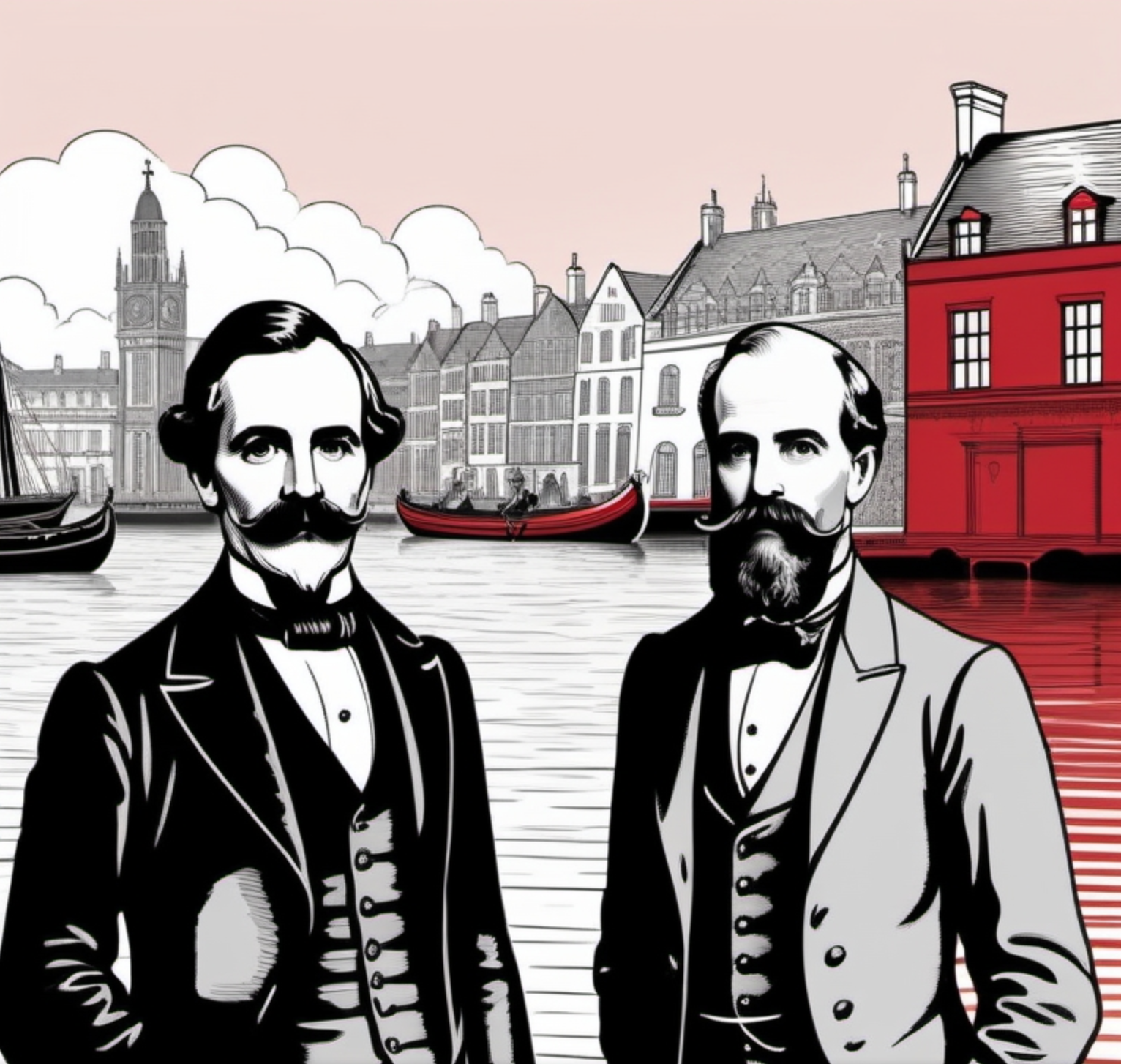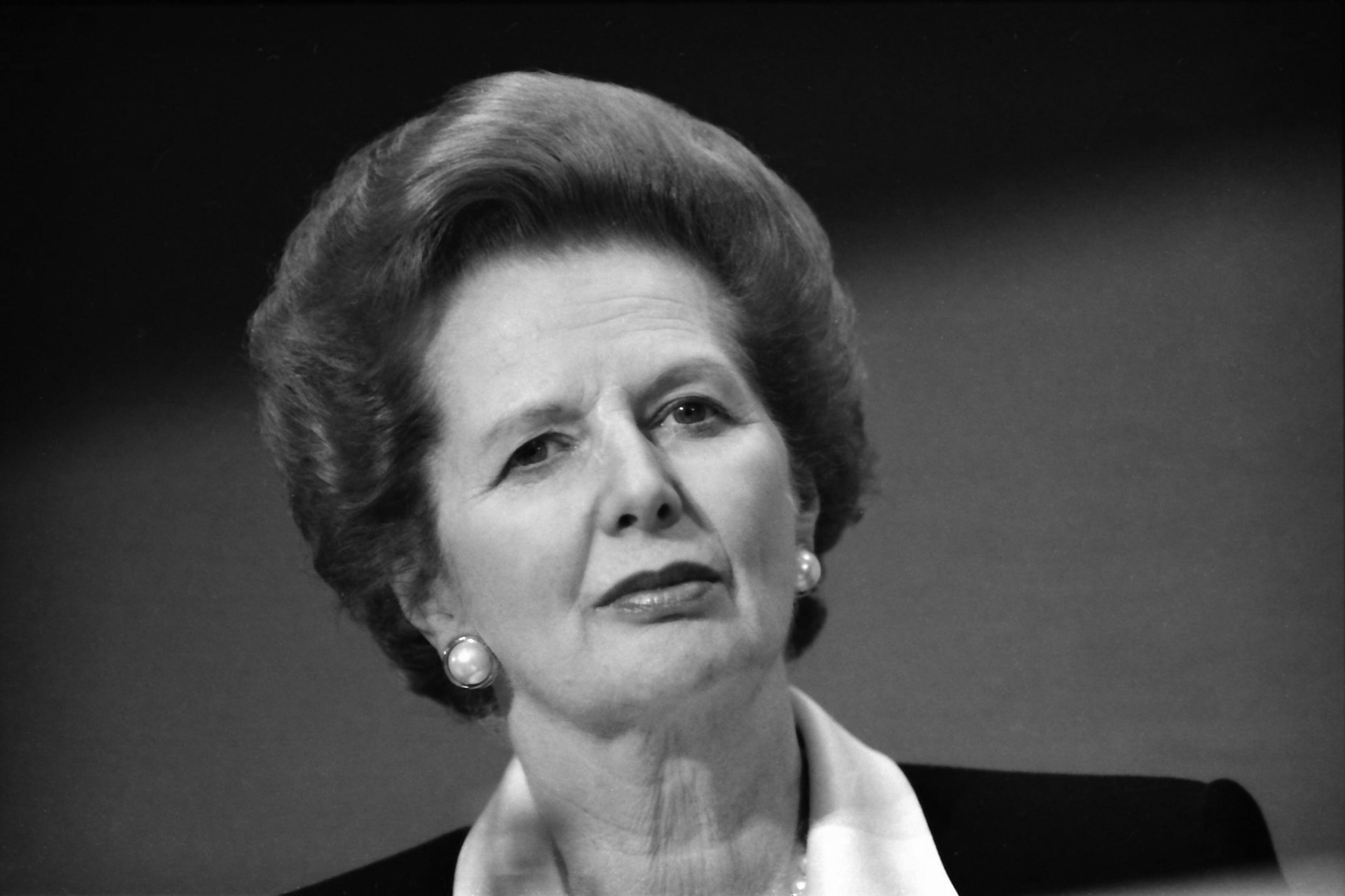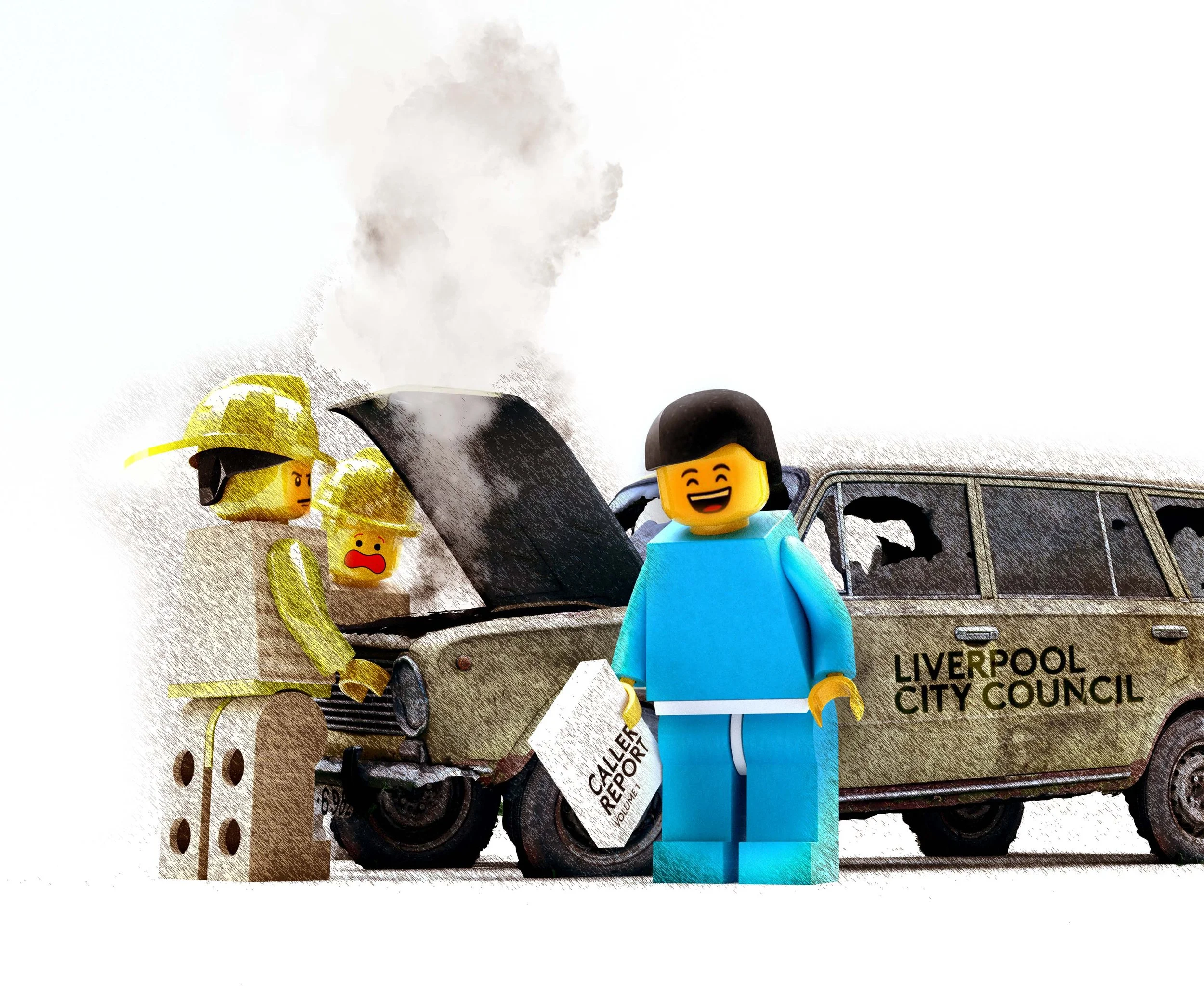Recent features
Mancpool: One Mayor, One Authority, One Vision?
Should the city of Liverpool throw in its lot with Manchester and accept one combined North West Metro Mayor to rule us all? Despite admitting that such a suggestion is about as saleable as a One State Solution for Israel-Palestine, Jon Egan thinks it’s an idea whose time has come. It’s certainly an idea that’s provoked some debate within Liverpolitan Towers. But what do you think?
Jon Egan
Manchester Bees Meet Liverpool Super Lambananas by mmcd studio
Is it time the city of Liverpool threw its lot in with Manchester and accepted one combined North West Metro Mayor to rule us all? Jon Egan thinks so. As you can imagine, the suggestion has caused some debate in Liverpolitan Towers and we are not all in agreement. But what do you think? Here Jon makes his case and hints at future initiatives to come…
So let me issue a warning now. This article contains material that many Liverpudlians will find deeply distressing and offensive. It’s an argument that I have tentatively proffered in the past, but after profound and serious reflection, have concluded, now needs to be set out in the most explicit and uncompromising of terms. You have been warned.
David Lloyd’s recent article for The Post lamenting the exodus of Liverpool’s “best and brightest” was as ever an enlightening and enjoyable read, notwithstanding its downbeat and dispiriting narrative of civic and economic decline. If I can add a generational postscript in support of David’s thesis, every member of our youngest daughter’s friendship group from Bluecoat School now lives and works outside Liverpool.
It was the nineteenth century philosopher, Friedrich Nietzche who argued that only as an “aesthetic phenomenon” does the tragedy of human existence find its eternal justification, and perhaps it’s only in the exquisite prose and imaginative virtuosity of David’s writing that Liverpool’s own tragic predicament becomes philosophically palatable. I admire David’s resolute determination to find some tiny component of hope, offered in the city’s joyously ephemeral hosting of Eurovision 2023. But does our capacity for celebration, hospitality and togetherness provide the alchemy for a viable economic renaissance? Does it, at best, illuminate Liverpool’s status as a half-city, stripped of its economic and productive assets, now reduced to the sheer potentiality of its human capital?
The idea of Liverpool as a stage set for cultural spectacles and entertainment extravaganzas (hyperbolically described by the city’s cultural supremo, Claire McColgan as “moments of absolute global significance”), is a beguiling substitute for an actual economy, and an ability to offer a livelihood for the generations who continue to depart for more attractive and seemingly successful cities. It’s a vision that also reminds me of another of Italo Calvino’s magical realist parables in his masterpiece novel, Invisible Cities. Sophronia, the half-city of roller-coasters, carousels, Ferris wheels and big tops, where it is the banks, factories, ministries and docks that are dismantled, loaded onto trailers and taken away to their next travelling destination.
“I fully grasp the deeply heretical nature of this proposition. A ‘One State’ solution for the Liverpool and Manchester City Regions is about as saleable as a one state solution for Israel and Palestine.”
Two hundred years ago, the realisation that we were a half-city inspired Liverpool’s city fathers to contemplate a project that would have world-changing implications - a genuine moment of “absolute global significance”. Prior to the construction of the world’s first inter-city railway, every human journey between major population centres would be dependent on the locomotive capabilities of the horse. Railways were the harbingers of modernity, compressing time and space, and in this instance, connecting one of the world’s great trading centres with its greatest manufacturing hub. Umbilically conjoined, the two half-cities (the place that trades and the place that makes), became the nexus for Britain’s industrial and imperial prowess for the next hundred years.
If the railway brought Liverpool and Manchester closer together, recent decades have been dominated by a football-terrace inspired antagonism aimed at driving us further apart. Liverpool’s antipathy to our more affluent neighbour would seem also to betray more than a slight hint of jealousy, as our rival has greedily accumulated the trappings and status of regional capital.
Rather than resenting Manchester’s success or investing in a strategy of do-or-die competition, is there a smarter and mutually beneficial alternative? Is it time to re-imagine a more symbiotic relationship, that realises that for every British provincial city, the real competition is located 200 miles to the south?
Of course, this is not an original proposition. In the early noughties, Liverpool Leader, Mike Storey and his Manchester counterpart, Richard Leese signed their much lauded Joint Concordat - an agreement only marginally less shocking than the Molotov-Ribbentrop ‘Non-Aggression’ Pact of 1939 between Nazi Germany and the Soviet Union. The benefits were equally short lived. The agreement was conceived in the golden age of regionalism when under the aegis of John Prescott’s mega-ministry - the Department for the Environment, Transport and the Regions - levelling-up and rebalancing were not mere meaningless mantras but core political imperatives. For all its good works, the now defunct North West Development Agency, which once employed 500 people to drive the region’s growth, was more of a hindrance than an enabler for a serious rapprochement between the city’s two main economic players. Determined to uphold scrupulous neutrality between Liverpool and Manchester (it’s Warrington-base memorably described by broadcaster and musical impresario Tony Wilson as being located in the “perineum” of the North West), the agency was forged by a powerful Labour Lancashire mafia, with a brief to prevent and constrain the domineering tendencies of the two cities.
The ill-fated 2001 Joint Concordat between Liverpool and Manchester was only marginally more palatable than the Molotov-Ribbentrop Pact of 1939 which saw the carve up of Poland. Bundesarchiv, Bild 183-H27337 / CC-BY-SA 3.0
“The idea of Liverpool as a stage set for cultural spectacles and entertainment extravaganzas is a beguiling substitute for an actual economy.”
The Storey-Leese pact conceded Manchester’s status as regional capital, a painful admission of subservience that probably explains the reluctance of subsequent Liverpool leaders to pursue similar overtures. The Liverpool City Region and Greater Manchester devolution deals, and the election of “great mates” Steve Rotheram and Andy Burnham has seen little practical collaboration, beyond occasional media stunts and chummy get-togethers to compare their favourite home-grown pop tunes. Those who expected more than a Northern Variety Hall double act have thus far been disappointed by devolution projects intent on protecting sub-regional domains and denying the compelling reality of geographic and economic interdependence.
We’re two cities less than 30 miles apart, whose fuzzy edges and increasingly footloose populations are blind to civic boundaries that no longer delineate where or how people live, work and play. People are already beginning to see and experience the cities as a single urban place - we just need to dismantle some of the physical and administrative obstacles.
It is beyond farcical that train travel between the two city centres is only marginally quicker today than it was when Stephenson’s Rocket completed its maiden journey two centuries ago. At a pre-MIPIM real estate seminar a few years ago, a Liverpool property professional opined that the single biggest boost to Liverpool’s commercial office market would be a 20 minute train service to Manchester city centre. Who knows, it may even have been enough to persuade Liverpool-nurtured companies like the sports fashion-brand, Castore, to stay in a better connected city location instead of moving to our city neighbour (and taking 300 jobs with it). Questioning the benefits of a fully integrated single strategic transport authority to straddle the two city-regions, is equivalent to advocating the abolition of Transport for London and its replacement by two rival authorities with briefs never to talk to each other.
“Rather than resenting Manchester’s success or investing in a strategy of do-or-die competition, is there a smarter and mutually beneficial alternative?”
For those who ask what’s in it for Manchester, the answer is the well attested and quantifiable benefits of economic agglomeration - cost efficiencies, labour pooling, expanded markets, knowledge spill-overs… Whilst working for the think tank, ResPublica on a project to build the economic case for Liverpool’s connection to HS2, I was staggered to hear Manchester’s economic strategist Mike Emmerich admit that his city envied aspects of Liverpool’s asset-base. The hard and soft criteria by which urban theorists like Saskia Sassen measure the credentials of aspiring global cities, seem evenly dispersed between the twin cities of the Mersey Valley. We can’t match Manchester’s international transport connections, its media and knowledge clusters, but neither can they compete with Liverpool’s global brand, our cultural prowess, architectural grandeur and liveability offer.
If transport is the no-brainer, the wider benefits of agglomeration need to be systematically mapped and identified. The amorphous promise of a Northern Powerhouse can only be realised in physical space, and the contiguity of our two city regions make this the most viable location for a re-balancing project. If the North is ever to grow an economic counter-weight to London, then connecting the two closest jigsaw pieces together seems like a sensible undertaking. Whether its land-use planning or plotting economic development, investment and skills strategies, it’s nonsensical for the two city regions to be pursuing their respective goals in blissful oblivion of what is happening on the other side of an arbitrarily contrived line on a map.
Notwithstanding, its invaluable enabling role in gap funding development and infrastructure projects, the North West Development Agency was a political creation without underpinning logic or legitimacy. Were there ever any connecting threads of economic interest between Salford and Penrith? Wilmslow and Barrow-in-Furness? The Agency’s opaque governance, and its tortuous high-wire balancing act, placating a multiplicity of sub-regional agendas and interest groups, inhibited its ability to optimise the potential of the region’s two great economic engines.
So here comes the controversial bit. Pacts, concordats and convivial personal relationships are simply not sufficient to realise the potential of a new economic relationship between the two city regions - one that acknowledges that their respective asset-bases can be curated for mutual benefit. The only solution is a new governance structure - a devolution model with one Metro Mayor and one Combined Authority. I fully grasp the deeply heretical nature of this proposition, and the threat that it seems to pose to the identity and autonomy of a city that suspects it will be the junior player in any such arrangement. But are identities any more compromised in a ‘Twin City Region’ than they are within the current dispensation? St Helens, Sefton, Wirral, Wigan, Bolton amongst others would probably argue not. The integrity and jurisdiction of the respective city councils and other local authorities would not be compromised - we would only be pooling functions and responsibilities that are already acknowledged to be regional, and projecting them onto a bigger and less artificially contrived regional canvas.
“The only solution is a new governance structure - a devolution model with one Metro Mayor and one Combined Authority.”
Once upon a time, Liverpool and Manchester were authorities under the even more commodious administrative umbrella of Lancashire County Council, and as I‘ve mentioned, more recently, through the North West Development Agency, we were content to buy into the concept of a North West regional project conspicuously lacking any democratic accountability.
In a Twitter / X exchange with Liverpolitan a few weeks ago, I was asked to defend this joint governance proposition by pointing to a successful or established similar model elsewhere in the world. In the US, the twin cities of Minneapolis and St Paul, and of Dallas and Fort Worth, and the urban centres of the San Francisco Bay Area have come together in different ways to pool planning, transportation and economic development responsibilities. Closer to home, the Ruhr Regional Association in Germany exercises both a statutory and enabling role in areas including planning, infrastructure, economic development and environmental protection for the cities of Dortmund, Duisburg, Essen and Bochum. But even if there is no precise template elsewhere, should this be an inhibitor to the cities that built the world’s first inter-city railway, and that pioneered many of the most progressive advances in civic governance in the 19th and early 20th centuries?
In the absence of compelling practical arguments against the proposition, the most likely and persuasive objection will be that the mutual rivalry runs too deep, the antagonism is simply too intense and has festered too long. A ‘One State’ solution for the Liverpool and Manchester City Regions is about as saleable as a one state solution for Israel and Palestine. Maybe it’s an argument that requires a solution or a process rather than a rebuttal. In truth, antipathy is a quite recent addition to a history of rivalry that owes more than a little to the intensity of the competition between the country’s two most successful football teams. Exorcism perhaps requires a practical project, an enthusing collaboration that focuses on shared cultural attributes and ambitions. Somewhere not far away such an idea is maturing, but I will leave it to its progenitors to expand, perhaps on this platform, and maybe very soon.
Of course, there is another motive and spur for this idea which relates to the abject failure of governance within the city of Liverpool and the continuing inability of its dysfunctional political class to nurture or curate those incipient possibilities that so rarely reach fulfilment. The uprooting of Castore from Liverpool to Manchester is an instructive case study, but so too are the games companies, the biotech businesses, legal and insurance firms that have hatched in Liverpool and gone on to prosper elsewhere. Maybe we need governance less rooted in parochial politics and less constrained by cultural legacy. To borrow an analogy from Iain McGilchrist’s Divided Brain hypothesis, perhaps Manchester’s busy-bee utilitarianism and non-conformist pragmatism is the left hemisphere counterpoint to Liverpool’s wistful dreaminess (even our civic emblem is an imaginary being). Is it just possible that our divergent dispositions and outlooks are not actually a prescription for unending antagonism but the formula for a fruitful alchemy?
Jon Egan is a former electoral strategist for the Labour Party and has worked as a public affairs and policy consultant in Liverpool for over 30 years. He helped design the communication strategy for Liverpool’s Capital of Culture bid and advised the city on its post-2008 marketing strategy. He is an associate researcher with think tank, ResPublica.
Share this article
What do you think? Let us know.
Write a letter for our Short Reads section, join the debate via Twitter or Facebook or just drop us a line at team@liverpolitan.co.uk
The Scourge of Northwesternism
In England’s Northwest, one city blooms while another withers on the vine. Manchester is reaching for the skies while Liverpool stares at its navel. A cancerous rot is eating away at my city’s self-esteem. It deserves a name. I call it Northwesternism.
Michael McDonough and Paul Bryan
Does anyone else notice that simmering sense of defeatism running through pretty much everything Liverpool does today? Whether it’s politics, culture or architecture there seems to be a crushing sense of meekness dragging down or at the very least blowing off course the city’s regeneration. You don’t have to look too far to find the evidence, from Liverpool’s proposed new stumpy, tall buildings policy, to the attempts to rejuvenate the high street with low-class tat like bingo and go-karts. Even our waterfront indoor arena was built patently too small to compete for the best music acts. We seem to have gotten good at hiding ourselves under a rock.
I noticed this sense of defeatism running through what was otherwise a riveting read by Jon Egan in his recent Liverpolitan article, ‘It’s Time to Get Interesting’. Examining Liverpool’s fallen place in the world, he searched for a solution and built it on the stoniest ground. Believing that “Liverpool’s claims to regional dominance is a boat that has long since sailed”, he called it an “unavoidable truth” that Manchester is now established as the region’s capital. Then from that premise he pitched an idea - unable to escape our fate as the North West’s second fiddle, we should lower our goals and find a workaround based on our outsider status and our sense of difference. He suggested we do this, by making ourselves ‘interesting’, something that comes naturally to us because it’s kind of in our social DNA. Austin, Texas was held up as a possible model to follow, a city which carves out its place in the world under the banner, ‘Keep Austin Weird’.
Now, I know that Jon doesn’t intend to cast Liverpool as a dancing monkey at a freak show, and you could argue that the economic data points to the truth of our cities relative position, but I don’t really see this strategy solving the myriad economic and social problems that Liverpool faces. It doesn’t sound all that far removed from the innovation strategies that have largely failed to deliver innovation. But my biggest problem with it is that it’s premised on pessimism. For me the race to become interesting or to live into our sense of cultural difference is just a way of rationalising our lowered position.
For me this all smacks of a cancerous rot eating away at Liverpool’s self-esteem. A long gestating idea that Liverpool cannot and will not ever again be more than an offshoot of the aspirations of another relatively small, regional UK city. Who the hell wants that? It’s a view that forces us to lower our horizons and settle for less and it has only one direction of travel - from city to village in countless, tiny steps.
Manchester at night. Just down the road things looked a little different. Chris Chambers / Alamy
I’m sad to say I increasingly see evidence of this sense of cultural pessimism all around me. They say, make no small plans, but we’re becoming experts at it, and you’ll find a whole breed of shamanistic professionals, activists or NIMBYs throwing shade on the very idea of planning big, going tall, and growing our economy. Sometimes they even reject the very concept of competing. This low growth rationalisation of defeat is usually wrapped in warm fuzzy words like sustainability or human-centred development, while a more optimistic view is seen as foolishly utopian or an apologetic for predatory capitalism. Yet just a few miles down the road things look quite different. And for those who want more, it’s often easier to just pack their bags and relocate.
Too much of our professional class appears to have succumbed to the Liverpool-killing long game of ‘regionalism’ - the modern face of managed decline. You can hear it in the language, and see it in the initiatives. It’s almost as if a subconscious decision-making 'culture' has pushed Liverpool to the periphery. Seeing yourself as secondary or even tertiary is now so ingrained that Liverpool no longer feels it can compete with what is merely another UK provincial city. So instead we see attempts to 'partner', 'work with’ and ‘align with’ Manchester-based institutions, which feels more and more like surrender rather than balanced cooperation.
Of course, ego won’t let us admit this and any self-respecting scouser will bristle at the very idea of Manchester as the regional capital; dark insecurities soothed by talk of world-class this and world-class that. Perhaps if we host Eurovision we’ll feel relevant again? But it doesn’t mean this humbling process isn’t happening or hasn’t already happened right under our noses. It’s all part of the perpetual grind of what I call ‘Northwesternism’. It’s part policy and part psychology – the forces of economic agglomeration, and political influence colliding with the endless boosterism of a perpetually on the front-foot city, culturally pump-primed by a media only too willing to play along. Drip, drip, drip bleed the jobs and opportunities; young lives transfused away. On the Liverpool side, we put the blinkers on, our taxi drivers famed for telling all and sundry ‘things are getting better’. Do they still say that? Over time, our inferiority complex becomes so ingrained that when the subject of the problematic Liverpool-Manchester relationship is brought up it’s laughed at or sneered at, dismissed as some kind of conspiracy theory. But then you just have to look at our graduate retention numbers. Deep down we just know.
“The idea that our two cities, separated by a mere 32.9 miles are not in competition with each other is a supreme act of gaslighting.”
Anthony Murphy of the University of Liverpool Management School recently posted on Twitter that “Smart young people from the city see it that way - flocking there for decent, well-paid jobs”. He wasn’t talking about Liverpool. Sometimes, being the capital is a state of mind. They have it, we don’t and they have the jobs too.
Our subconscious defeatism makes us smaller, lesser and this shows across so many sectors. We've almost got Stockholm Syndrome. I believe that Liverpool's malaise and rudderless direction have been a wonderful gift to Manchester's leaders creating a workforce that only ever travels east in the morning.
‘Northwesternism’, the passive acceptance that Manchester is the region’s dominant Silverback, is for me Liverpool’s greatest challenge in re-asserting itself as a major city. Our leaders should go into every regional partnership meeting with their eyes open, asking themselves ‘what’s in it for us?’ In Jon Egan’s article, he discussed how ‘Manchester is definitively and inexorably set on its own northern trajectory’. That being the case, why on earth does our Metro Mayor Steve Rotherham continue to insist on working so closely with Manchester’s Mayor, Andy Burnham? They have their own trajectory and set of goals, and they are not the same as ours. Increasingly, it feels to me as though Andy Burnham is entertaining one of the Greater Manchester boroughs – once Liverpool, now Manchester-on-Sea.
Do a little research and you’ll discover Mr Rotheram more often than not is stood behind Andy Burnham in public images and media features. Burnham is always positioned at the centre. There are no calls for Rotherham to be christened the ‘King of the North’; no bets placed on Steve Rotherham to be a future Prime Minister, and certainly no column in the London Evening Standard. You could ask why any of this matters, but in an era of image and soft power projection, Liverpool is suspiciously absent from the national conversation, a recommended city break in the Telegraph, but fringe where it counts.
Until Liverpool rejects ‘Northwesternism’ and the slow but steady spread of Manchester’s well-oiled and expanding ‘psychogeography’, then Liverpool cannot confidently look outward to the rest of the world as it will be forever undermined on its own doorstep.
I think we have to wake up and fast. And now Levelling Up Secretary, Greg Clarke, has just invited Sir Howard Bernstein, Manchester City Council’s former Chief Executive to help draw up a vision for our city’s future, something our own council has singularly failed to do themselves. He’ll be joined by Judith Blake, former Leader of Leeds Council, Steve Rotheram and an as yet unnamed person from the business sector. Excellent administrators though they are, I can’t help wondering if Howard and Judith will have Liverpool’s best interests at heart. Maybe they will. We can hope for the best. Would Bernstein propose anything that might weaken Manchester’s grip given he spent his whole career building their success? Would he want to champion our promising games industry or eye it as yet another prospect to wine and dine? Would Judith support a significant expansion of our legal sector given Leed’s strengths in that area? At the very least, we need to stay awake to our own interests at all times and turn a deaf ear to those who say competing is for chumps – that Liverpool can exist in its own utopian bubble where the lion lays down with the lamb.
“This low growth rationalisation of defeat is usually wrapped in warm fuzzy words like sustainability or human-centred development, while a more optimistic view is seen as foolishly utopian or an apologetic for predatory capitalism.”
MANCHESTER nakedly pursues its own interests. There’s nothing wrong with that – I’m not passing moral judgement but the idea that our two cities, separated by a mere 32.9 miles are not in competition with each other is a supreme act of gaslighting. The fact that so many members of Liverpool’s political and business communities have fallen for it, like hostages besotted with their kidnappers, is evidence of either a stunning lack of self-awareness or a cynical judgement on moving as the wind blows, taking advantage of a new reality while tucking the loser in bed and whispering in their ear that everything will be alright.
The decision in 1997 to approve Manchester Airport’s second runway over expansion at Liverpool was not in our interests. It was in theirs. The building of Media City in 2007 with its gravitational pull on all TV production led to the closing of our own Granada TV Studio at Albert Dock. It was not in our interests. It was in theirs. The conscious derailment by the Greater Manchester Combined Authority in 2012 of the Atlantic Gateway strategy which would have seen multi-billion pound investments along the Ship Canal land corridor including at Liverpool and Wirral Waters was torpedoed in favour of a focus on city regions and what became the Northern Powerhouse with the cheques signed off in George Osbourne’s Tatton constituency. It sank the prospect of region-wide regeneration in favour of the city to the east. It was not in our interests. It was in theirs. The decision to build two gold-plated HS2 stations in Manchester and Manchester Airport (and none in Liverpool), given the nod in 2013, meant an unnecessary dog-leg and longer commutes between the cities. It was not in our interests. It was in theirs. Not that Joe Anderson would have noticed. He was like a blind man in a room full of alligators. Food for the predators. But the piece de resistance dates back to 2001 and the signing of the hard to believe Manchester-Liverpool Joint Concordat Agreement by the leaders of the two cities under the watchful eyes of the then Deputy Prime Minister, John Prescott and the supposedly neutral North West Development Agency. Inspired by a Salford University academic, the agreement proposed to end our ancient enmity once and for all. As noted in the Independent, the Concordat bluntly concluded that Manchester was the "regional capital" and there is "little sense in Liverpool seeking to challenge that reality". It must have been hard to suppress the sniggers. Whole industry sectors were carved out for non-competition, the kind of ones that generally required office space and high paying skills. Liverpool’s “unique attributes and distinctive economic strengths” won it tourism and culture, and then Manchester, with a belly full of everything else, went after that anyway with its £114m government funded Factory arts venue and it’s Art Council supported Manchester International Festival. Needless to say this sorry document - the Joint Concordat - was not in our interests. It was in theirs. That a Liverpool Council Leader – Lib Dem, Mike Storey, saw fit to sign such a blatant sell-out of his constituents’ futures shows that he was nowhere near as clever as he thought he was. He was played pure and simple. Either that or he had a masochistic streak, though the fact he ended up in the House of Lords suggests he wasn’t the one feeling the pain. The story doesn’t end there of course – the drip, drip, drip of consequence – of capital and talent continuing to haemorrhage away. Companies like Castore, Redx and Biofortuna. The grass definitely greener on the other side.
I can’t condemn Manchester for acting in its own interests. I just want the same for Liverpool. I want us to wake up to our interests. To fight for them and to have the good sense to know when we are being had. To stop being a patsy. To stop playing the fool. Talk that cities don’t need to compete is fitting of the dunce cap and I think we’d all prefer to wear more desirable head gear.
“That a Liverpool Council Leader – Lib Dem, Mike Storey, saw fit to sign such a blatant sell-out of his constituents’ futures shows that he was nowhere near as clever as he thought he was. He was played pure and simple.”
The recent spat between local councillors and developers at Waterloo Dock was a symbol of another fine mess we’ve built for ourselves – another expression of Liverpool’s ability to trip on its own feet. Amongst the general rot and dereliction, we built a complex nest of low aspirations to house not Canada Geese, but local representatives, who like squawking chicks pretended their advocacy of ‘blue space’ was a defence of high aspiration and ‘world-class’ heritage. That phrase again. It was nothing of the kind.
The enraged opposition to the development of what is to any sane person a piece of wasteland was deeply embarrassing to watch. Frustrating attempts to encourage inward investment, councillors cronied up to self-interested NIMBYS who were out to protect their own river views. In doing so, they further entrenched an anti-capitalist, ‘scousers versus the world’ mentality. By pitching local people against ‘greedy developers’ and roping in heritage ‘concerns’, they found a new way to frustrate Liverpool’s aspirations, and in the process convinced some poor sod from the Planning Department to embarrass himself at the appeal. Thankfully on this occasion reason won out and the determined developer won the day. I suspect we’re wiser to their tricks now. The ‘build nothing’ types will find it harder to play their games in the future.
Rabbits were suddenly ‘discovered’ in Bixteth Gardens by campaigners against an office development. Photo by Gavin Allanwood on Unsplash
Even with the Waterloo Dock development getting over the line, there does seem to be a sense of red brick, low-rise defeatism in the city’s modern architectural landscape. Where cities like Manchester and Birmingham go big, Liverpool has managed to shroud its lack of urban aspiration in a thin veil of heritage and ill-informed talk of ‘human scale’. While Manchester and other progressive cities throw up new developments like confetti providing new homes, jobs and office spaces for international companies, Liverpool’s local councillors, like Labour’s Nick Small, shamefully protest against developments such as Pall Mall, a long overdue project to bring Grade A office space to a city that has one of the smallest portfolios of commercial floorspace in the country.
Why did the protesters object? Rabbits. Now I’m all for the protection of wildlife but the former Liverpool Exchange station site is not the setting for Watership Down. I’d much rather see our public institutions looking to attract companies out of rival conurbations and into our own central business district, incentivising them to base in new, large-scale, glass, brick and steel office blocks. But that sounds too much like hard work. I guess it’s much easier to rationalise doing nothing by weaving an almost religious acceptance to it. Building is for other cities, it’s not for us. We have another vision. What is it? Don’t know.
What Liverpool needs desperately is to find leaders in business, politics and the community who are unashamedly ambitious. But what does that ambition look like? Ambition and aspiration for Liverpool should be in the form of a real, tangible plan to re-position the city at the forefront of northern politics and to openly and confidently shun any notion of northern capitals in Manchester. In fact, I would suggest making it a core strategy to pull as much investment, business and talent away from our northern neighbours and London as is humanly possible. Let them know they are in a fight. We Come Not To Play. Liverpool gains next to nothing from ‘collaboration’ with Manchester, never has and never will. If anything, in our naivete we are just helping to reinforce this self-defeating status quo.
Michael McDonough is the Art Director and Co-Founder of Liverpolitan. He is also a lead creative specialising in 3D and animation, film and conceptual spatial design.






































